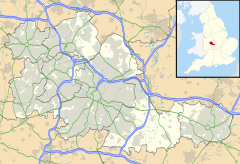Sutton Coldfield television transmitter
| Location | Sutton Coldfield, Birmingham England |
|---|---|
| Mast height | 270.5 metres (887 ft) |
| Coordinates | 52°36′2″N 1°50′2″W / 52.60056°N 1.83389°WCoordinates: 52°36′2″N 1°50′2″W / 52.60056°N 1.83389°W |
| Grid reference | SK113003 |
| Built | 1949 |
| BBC region | BBC West Midlands |
| ITV region | ITV Central |
| Local TV service | Made in Birmingham |
The Sutton Coldfield transmitting station is a broadcasting and telecommunications facility located in Sutton Coldfield near Birmingham, England. In terms of population covered, it is the second most important transmitter in the UK, after Crystal Palace in London.
On 17 December 1949, it became the first television transmitter to broadcast outside London and the Home Counties, bringing BBC Television to viewers outside of the south-east of England for the first time.
A new mast was built around 1983 to replace the original structure, primarily to support new mixed-polarisation FM antennas.
A 240.2m temporary mast was erected alongside the original mast in the spring of 2009 so that work could proceed in raising the height of the original mast by 31m (to a total height of 270.5m). After four years in service and almost a year after the completion of digital switch over, the temporary mast was removed during August 2013.
All analogue TV transmissions ceased on 21 September 2011, as part of the digital switchover. This made it one of the oldest transmitters in the country to formally end analogue broadcasts.
With a mast height of 270.5 metres (887 ft), it is one of the most powerful transmitters in England, powered at 200 kilowatts ERP for digital television and 250 kW for FM radio. The coverage extends as far south as Chipping Norton in Oxfordshire and as far north as Stoke-on-Trent. However, there are many relay transmitters around the Midlands that extend coverage even further.
...
Wikipedia

